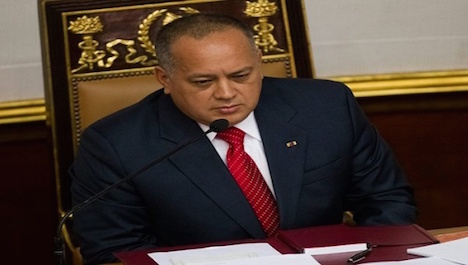The U.S. is protecting a former body guard who claims to have denounced a Venezuelan government official’s so called links to drug trafficking, and has opened up an investigation. Diosdado Cabello, president of the National Assembly and first vice president of the United Socialist Party of Venezuela (PSUV) responded on Tuesday to allegations by his former bodyguard that he supposedly has links to drug trafficking. “Every attack against me strengthens my spirit and my commitment. I am infinitely grateful for the solidarity shown by our people,” he wrote on Twitter. “Threats, slander, scheming – we have experienced it all in these years of revolution. We learnt from the best to navigate storms with our morale high” “The campaign against Diosdado Cabello is tasteless,” Venezuelan president Nicolas Maduro said on Tuesday, while participating in the national civic-military meeting against the economic war in Caracas. Historically, the U.S. has been documented to have used its so called “war on drugs” to criminalize revolutionary and poor peoples' struggles. Cabello's former chief of security Leamsy Salazar left Venezuela in December, and this week surfaced in the United States to accuse Cabello of supposedly having “links” to illegal activities. Venezuelan private media, as well as some international private media, have reported Salazar's claims as though they were true. The accusations come three months after Venezuelan youth leader and legislator Robert Serra was murdered, with his own bodyguard among the conspirators. According to Maduro, the bodyguard confessed to conspiring with a Colombian gang to kill Serra. The Miami based El Nuevo Herald said that Salazar is “collaborating” with U.S. investigators, citing so called anonymous sources. EFE too has quoted an anonymous U.S. official who supposedly said that the accusations made by Salazar were “consistent” with Washington's analysis about so called collusion between the national Venezuelan government and drug cartels. However, pro-government legislator Pedro Carreno alleged on Monday that Salazar had been “bought by the CIA” in order to link Cabello to drug smuggling and delegitimize the government. Indeed, the Nuevo Herald quoted its so called “anonymous source” as saying that Salazar's statements were “the worst blow that Chavismo has received.” Further, on Tuesday Spanish daily the ABC published an article claiming that the federal court in the South District of New York was conducting an investigation into Cabello and supposed links with a drug cartel apparently called “Soles.” The ABC did not explain how Venezuelan internal affairs enter into the New York court's jurisdiction. The ABC article claimed that Salazar had said Cuba was also somehow involved in assisting with drug trafficking routes between Venezuela to the U.S. It is well known however, that Colombia is one of the main regions where drugs are produced, as well as the U.S. and that it is difficult to get from Cuba to the U.S, with or without permission. The ABC also alleged that Salazar said in his “revelations” that Merida born, University of Los Andes student and now Aragua governor Tareck el Aissami had connections to “Islamic networks,” without elaborating. Latabla.blogspot pointed out that one Twitter account called @leamsysalazar, which may or may not belong to Leamsy Salazar - an uncommon name in Venezuela - is followed by opposition leaders and figures Nelson Bocaranda, Leopoldo Lopez, Maria Corina Machado, and Rocio San Miguel. The accusations of links to drug smuggling come as Venezuelan authorities confiscated over 47 tons of drugs in 2014, up from 2013 and 2012 figures. Last year the Venezuelan National Antidrugs Office (ONA) conducted 37,359 activities; mostly preventative community and school drug education workshops and cultural events. While US officials have often accused Venezuela of “turning a blind eye” to drug smuggling in the country, as Reuters pointed out, it was after Venezuela broke ties with the United States Drug Enforcement Administration (DEA) in 2005 that it was able to properly combat the drug trafficking industry. Drug seizures between 2005 and 2013 more than doubled the amount hauled in in the six years prior to 2005 (462 tons compared to 209). Historically, the U.S. has been documented to have used its so called “war on drugs” to criminalize revolutionary and poor peoples' struggles. When Salazar arrived in Washington on Monday, according to the Nuevo Herald he was accompanied by DEA agents. The DEA agents have apparently offered him witness protection. Source URL |
